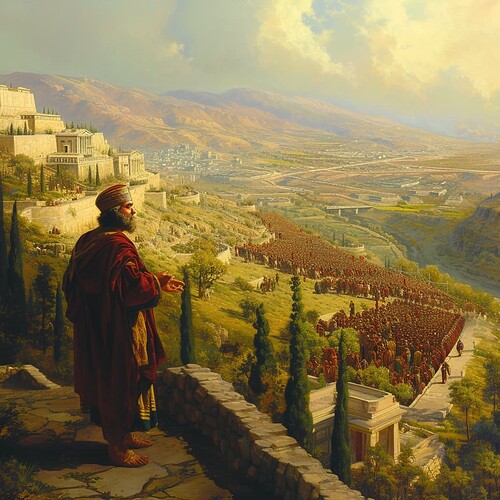 February 9: Psalm 72 - The Heartbeat of a King & Kingdom
February 9: Psalm 72 - The Heartbeat of a King & Kingdom
 Introduction
Introduction
Psalm 72, is an insight into the inspiration for a perfect king and an ideal kingdom. Authored by Solomon, this psalm showcases a vivid picture of a ruler who exhibits divine justice, compassion for the poor, and an eagerness for righteousness. This Psalm, while being a prayer by Solomon, also prophetically symbolizes the reign of Christ.
 Solomon’s Divine Reign
Solomon’s Divine Reign
Interestingly, the psalm begins not with an account of a successful reign, but a plea - a desire for path to follow. Solomon prays for wisdom to guide the people with equity (verse 2). He aspires for prosperity but not for personal gain - instead, for prosperity brought by righteousness that upholds the rights for the afflicted and prosperity that boosts the peace of the people:
 “Give the king Your judgments, O God, and Your righteousness to the king’s son” (verse 1).
“Give the king Your judgments, O God, and Your righteousness to the king’s son” (verse 1).
 Key Themes and Reflections
Key Themes and Reflections
 Leadership & Service
Leadership & Service
Perhaps the most important theme in Psalm 72 is the intertwining between leadership and service. A leader’s heart must be inclined to seeking justice, living with righteousness, and serving the less fortunate. In today’s context, these words continue to speak volumes to those in positions of power and authority - urging them towards greater empathy, justice, and a heart for service.
 The Perpetual Reign and Ideal Kingdom
The Perpetual Reign and Ideal Kingdom
This psalm creates a vision for a perfect kingdom where peace is like a river and righteousness like a never-ending mountain range. It reaffirms the promise of a future under the reign of Christ. The psalm prophetically celebrates a kingdom where affliction, oppression, and violence will be no more.
 Today’s Application
Today’s Application
As modern followers of Christ, while we may not all have the mantle of governmental leadership, the teaching in Psalm 72 has a practical daily application. It calls us to stand up for justice, serve those in need and seek peace in our lives and societies.
 Hidden Gem
Hidden Gem
Psalm 72 ends with, “The prayers of David, the son of Jesse, are ended”. Interestingly, this may not be a note from Solomon but a later editorial addition indicating the end of the second ‘book’ within the Psalms.
 Reflective Q&A
Reflective Q&A
![]() How does Psalm 72 relate to modern leadership principles?
How does Psalm 72 relate to modern leadership principles?
A: Psalm 72 underscores the values of empathy, righteousness, and justice - traits that continue to be vital for any modern leadership role.
![]() What insights does this psalm offer into the kingdom of God?
What insights does this psalm offer into the kingdom of God?
A: Psalm 72 artistically portrays the ideal kingdom where the poor are cared for, righteousness is abundant, and peace reigns - a reflection of the heavenly kingdom that Christ promises.
 Join the Discussion
Join the Discussion
What does leadership mean to you basing on Psalm 72? In what ways can you further implement Psalm 72’s teachings in your own sphere of influence?
 See You Tomorrow in Exodus 10
See You Tomorrow in Exodus 10
As we step into the world of Exodus 10, prepare to witness how God’s power overwhelms Pharaoh’s stubbornness, resulting in liberation for His chosen people.
Never forget, the realm of God’s kingdom begins in the heart. Our actions in the world should always reflect God’s love, wisdom, and justice. Let’s mould our leadership and influence to match the divine ideals of Psalm 72.
